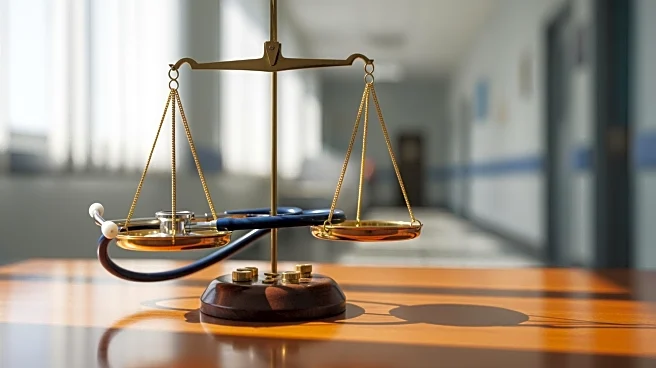What's Happening?
Charlie Javice, convicted of defrauding JPMorgan Chase & Co., has accused the bank of hypocrisy for objecting to paying her legal bills. JPMorgan has requested a Delaware court to cease its obligation
to cover legal costs for Javice and her co-defendant, Olivier Amar, citing the $115 million in defense costs as excessive. Javice's legal team argues that JPMorgan's own hiring of over 50 lawyers from six firms is hypocritical. The bank's delays in evidence disclosure are claimed to be the main reason for Javice's high defense costs. Javice was sentenced to seven years in prison, while Amar received five years and eight months. The Delaware court had previously ruled that JPMorgan must cover legal costs as part of the merger deal with Javice's company, Frank.
Why It's Important?
The dispute over legal fees highlights the complexities and financial burdens associated with high-profile corporate fraud cases. JPMorgan's stance on the legal costs reflects broader concerns about the financial implications of legal battles for major corporations. The case underscores the challenges companies face in mergers and acquisitions, particularly when fraudulent activities are involved. The outcome of this legal dispute could influence future corporate policies on legal cost coverage and impact how companies approach due diligence in acquisitions. Stakeholders in the financial and legal sectors are closely watching the case for its potential to set precedents in corporate legal obligations.
What's Next?
The Delaware court's decision on JPMorgan's objections to covering Javice's legal costs will be pivotal. If the court sides with JPMorgan, it could relieve the bank of significant financial obligations. Conversely, a ruling in favor of Javice could reinforce the court's previous decision, obligating JPMorgan to continue covering legal expenses. The case may prompt discussions among legal experts and corporate leaders about the fairness and scope of legal cost coverage in merger agreements. Additionally, Javice's appeal process, with her new legal representation, could further extend the legal proceedings and influence the final outcome.
Beyond the Headlines
The case raises ethical questions about corporate responsibility and the extent to which companies should be held accountable for legal costs in fraud cases. It also highlights the potential for legal strategies to impact sentencing outcomes, as seen in Javice's reduced sentence compared to government requests. The broader implications for corporate governance and legal accountability in the financial sector are significant, potentially affecting how companies manage legal risks and fraud prevention.









